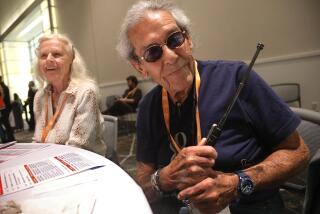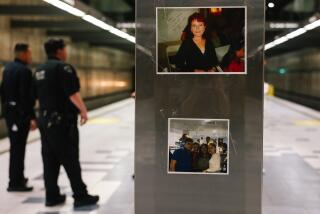Get Talking, Get Rolling
A population the size of FresnoŌĆÖs, OaklandŌĆÖs or SacramentoŌĆÖs, equivalent to every person in Tulsa, was left stranded Tuesday by the second Los Angeles County transit strike in three years.
The number alone -- 400,000 people, most of them low-wage workers, high school students or elderly residents who depend on buses and subways as their sole means of transportation -- should be enough to goad city, county and state leaders to do everything they can to bring the Metropolitan Transportation Authority board and striking MTA mechanics back to the bargaining table. And if that doesnŌĆÖt do it, there is always the memory of the last strike, in September and October 2000.
It lasted 32 long days. Workers who had no other way to get to their jobs lost them. Students flunked courses. Schools saw state payments based on enrollment drop. Even residents who wouldnŌĆÖt recognize a bus stop if they ran into the sign found their lives disrupted when their nannies couldnŌĆÖt get to work, and so they couldnŌĆÖt either. Surely these recent memories are enough for civic leaders to realize how crucial it is to press now, at the start, for a quick return to sense.
Like just about every other current labor dispute, this one centers around health-care costs. But in this case, thereŌĆÖs a difference.
The MTA contributes $1.4 million a month to a fund managed by the mechanics union to cover health insurance costs for its 2,500 members. The union says costs have increased to $1.9 million a month because of soaring premiums, a familiar lament. The MTA board hired an independent auditor, who says that the union, among other things, is mismanaging its money by using a health insurance broker who earns a commission based on monthly premiums and thus has no incentive to seek lower ones. The union dismissed the audit as ŌĆ£garbage.ŌĆØ
ItŌĆÖs not. The best candidates for convincing the union to drop its defensiveness and use the audit to find needed savings are elected leaders who enjoy laborŌĆÖs support and trust -- such as county Supervisor Gloria Molina, City Councilman Antonio Villaraigosa and Mayor James K. Hahn.
Then-Mayor Richard Riordan spent the first crucial days of the 2000 strike bicycling in France. At least Hahn is in town, but so far he has issued only a brief, low-key statement. An ethics rule prevents him from participating in negotiations because of union contributions to his political campaigns. But nothing stops him from aggressively using his bully pulpit, as Chicago Mayor Richard M. Daley did in his cityŌĆÖs just-ended garbage strike, to nudge the union back to the table -- and get the buses and trains running again. A city full of bus riders depends on him to do so.
More to Read
Sign up for Essential California
The most important California stories and recommendations in your inbox every morning.
You may occasionally receive promotional content from the Los Angeles Times.










